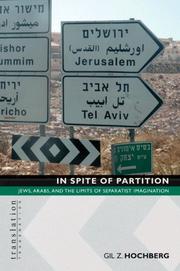| Listing 1 - 1 of 1 |
Sort by
|

ISBN: 1282665758 9786612665752 1400827930 9781400827930 9780691128757 0691128758 9781282665750 6612665750 Year: 2010 Publisher: Princeton, NJ
Abstract | Keywords | Export | Availability | Bookmark
 Loading...
Loading...Choose an application
- Reference Manager
- EndNote
- RefWorks (Direct export to RefWorks)
Partition--the idea of separating Jews and Arabs along ethnic or national lines--is a legacy at least as old as the Zionist-Palestinian conflict. Challenging the widespread "separatist imagination" behind partition, Gil Hochberg demonstrates the ways in which works of contemporary Jewish and Arab literature reject simple notions of separatism and instead display complex configurations of identity that emphasize the presence of alterity within the self--the Jew within the Arab, and the Arab within the Jew. In Spite of Partition examines Hebrew, Arabic, and French works that are largely unknown to English readers to reveal how, far from being independent, the signifiers "Jew" and "Arab" are inseparable. In a series of original close readings, Hochberg analyzes fascinating examples of such inseparability. In the Palestinian writer Anton Shammas's Hebrew novel Arabesques, the Israeli and Palestinian protagonists are a "schizophrenic pair" who "have not yet decided who is the ventriloquist of whom." And in the Moroccan Jewish writer Albert Swissa's Hebrew novel Aqud, the Moroccan-Israeli main character's identity is uneasily located between the "Moroccan Muslim boy he could have been" and the "Jewish Israeli boy he has become." Other examples draw attention to the intricate linguistic proximity of Hebrew and Arabic, the historical link between the traumatic memories of the Jewish Holocaust and the Palestinian Nakbah, and the libidinal ties that bind Jews and Arabs despite, or even because of, their current animosity.
Zionism in literature. --- Arabic fiction --- Arab-Israeli conflict --- Jews in literature. --- Jewish-Arab relations in literature. --- Israeli fiction --- Palestinian Arabs in literature. --- Arab-Israeli conflict in literature --- Israel-Arab conflicts in literature --- History and criticism. --- Literature and the conflict. --- Israel --- Ethnic relations. --- History and criticism --- A. B. Yehoshua. --- AMIT. --- Abjection. --- Aliyah. --- Alterity. --- Amalek. --- Ambiguity. --- Ambivalence. --- Anonymity. --- Anton Shammas. --- Arab Jews. --- Arab citizens of Israel. --- Arabs. --- Ari Shavit. --- Azmi Bishara. --- Being and Nothingness. --- Biculturalism. --- Bishara. --- Chadash. --- Chutzpah. --- Codependency. --- Colonialism. --- Constantine P. Cavafy. --- Cover-up. --- Criticism. --- Dan Miron. --- Darwish. --- Deleuze and Guattari. --- Deterritorialization. --- Edward Said. --- Elie Kedourie. --- Ella Shohat. --- Ethnocentrism. --- Exclusion. --- Fawaz. --- Georges Bataille. --- Haskalah. --- Ibn Kathir. --- Ideology. --- Imperialism. --- Irony. --- Israelis. --- Jacques Derrida. --- Jewish identity. --- Jews. --- Joseph Massad. --- Judaism. --- Judith Butler. --- Language policy. --- Law of Return. --- Liberalism. --- Literature. --- Ma'abarot. --- Margaret Larkin. --- Memoir. --- Metonymy. --- Mizrahi Jews. --- Monoculturalism. --- Narrative. --- National language. --- New antisemitism. --- Opportunism. --- Orientalism. --- Originality. --- Orthodox Judaism. --- Palestinian nationalism. --- Palestinian refugees. --- Palestinians. --- Postmodernism. --- Pretext. --- Proverb. --- Racism. --- Reactionary. --- Repressed memory. --- Resistance movement. --- Ressentiment. --- S. Yizhar. --- Saree Makdisi. --- Sayed Kashua. --- Secularism. --- Self-image. --- Separatism. --- Shlomo. --- Shukri. --- Sovereignty. --- Subjectivity. --- Superiority (short story). --- Taunting. --- The Colonizer and the Colonized. --- The Other Hand. --- Tom Segev. --- Tommy Lapid. --- Uri Davis. --- Western thought. --- Writing. --- Yair Auron. --- Yaron Tsur. --- Yeshiva. --- Ze'ev. --- Zionism.
| Listing 1 - 1 of 1 |
Sort by
|

 Search
Search Feedback
Feedback About UniCat
About UniCat  Help
Help News
News